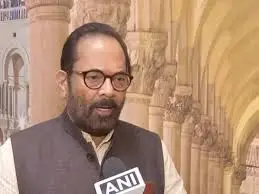Mukhtar Abbas Naqvi interview: ‘Waqf change an administrative reform, not religious… Only those who enjoyed a legal licence to loot are scared’

Union Minister Mukhtar Abbas Naqvi recently spoke out on the much-discussed reforms related to Waqf properties in India. He firmly stated that these reforms are administrative, not religious. According to Naqvi, the government’s goal is to clean up the management of Waqf assets and ensure transparency. He also pointed out that only those benefiting from misuse and illegal control feel threatened by these changes.
Waqf Reform: Clearing Misconceptions
Many misunderstand the Waqf reforms as interference in religious affairs. However, Naqvi clarified this is far from the truth. He explained, “Waqf reform is purely an administrative reform, aimed at improving governance.” The minister stressed that the reforms respect religious sentiments and do not interfere with any religious practices.
Historically, Waqf properties have been dedicated to charitable and religious causes within the Muslim community. Unfortunately, many such properties have suffered from poor management. Some were even illegally leased or encroached upon, causing significant losses. Therefore, the government stepped in to introduce reforms focused on accountability and transparency.
Why These Reforms Matter
Waqf properties hold immense value. They can fund schools, hospitals, and social welfare projects. Yet, due to mismanagement, the benefits did not reach the intended recipients. Naqvi argued that better management of these assets can greatly boost community welfare.
He said, “Proper oversight will stop the misuse of these properties and ensure that revenues serve the community.” This change can unlock the potential of Waqf properties, turning them into powerful tools for social upliftment.
Tackling Illegal Control and Corruption
The minister also addressed the resistance from some quarters. He explained that those who have enjoyed what he called a “legal licence to loot” these properties are the ones afraid of reform. Naqvi made it clear that the government’s focus is on rooting out corruption.
To achieve this, the reforms include digitizing records and improving transparency in Waqf boards’ functioning. These steps make it harder for anyone to manipulate the system or misuse funds. For example, fair and public allocation of resources will replace opaque practices.
Balancing Tradition with Governance
Naqvi repeatedly emphasized that the government is not targeting religion. Instead, the reforms aim to modernize the administration of Waqf properties without touching religious customs. “We respect religious autonomy and traditions,” he said, “but we cannot allow corruption to destroy community assets.”
This distinction is important, as it helps reduce fears among stakeholders. By separating administration from religious practice, the government hopes to gain wider acceptance for the reforms.
Positive Impact on the Muslim Community
The long-term benefits of proper Waqf management are promising. More funds will become available for education, healthcare, and social services within the community. This can empower marginalized groups and promote overall development.
Furthermore, transparent management builds trust among community members. When people see their assets handled properly, their confidence in the system grows. This encourages greater participation and support for charitable initiatives.
Addressing Concerns and Myths
Naqvi also took time to address misinformation surrounding the reforms. Some groups claimed that the government is trying to take over religious properties. However, the minister dismissed these allegations.
He said, “No religious rights are being violated. This is an effort to plug loopholes and end illegal control.” He urged everyone to focus on the benefits rather than fear unfounded rumors.
The Road Ahead for Waqf Reform
The government has already begun implementing key measures. These include creating a centralized digital database of Waqf properties to reduce errors and fraud. Additionally, strict monitoring mechanisms have been introduced to prevent illegal leasing and encroachment.
Naqvi stated that these efforts will continue with community cooperation. He encouraged stakeholders to actively participate in reform processes. “Together, we can build a transparent and efficient system that honors the spirit of Waqf.”
Conclusion: Reform for Justice and Development
In summary, Mukhtar Abbas Naqvi’s interview sheds light on the true purpose of Waqf reforms. They are about good governance, not religion. The government wants to protect valuable community assets from corruption and misuse.
By ensuring transparency and accountability, the reforms aim to boost social welfare funded through Waqf properties. While some groups resist due to fear of losing illegal control, the larger community stands to gain significantly.
These reforms mark a step forward in administrative efficiency and justice. If implemented effectively, they can transform Waqf assets into powerful tools for education, healthcare, and poverty alleviation. Ultimately, the changes seek to serve the people and strengthen the Muslim community’s socio-economic fabric.






